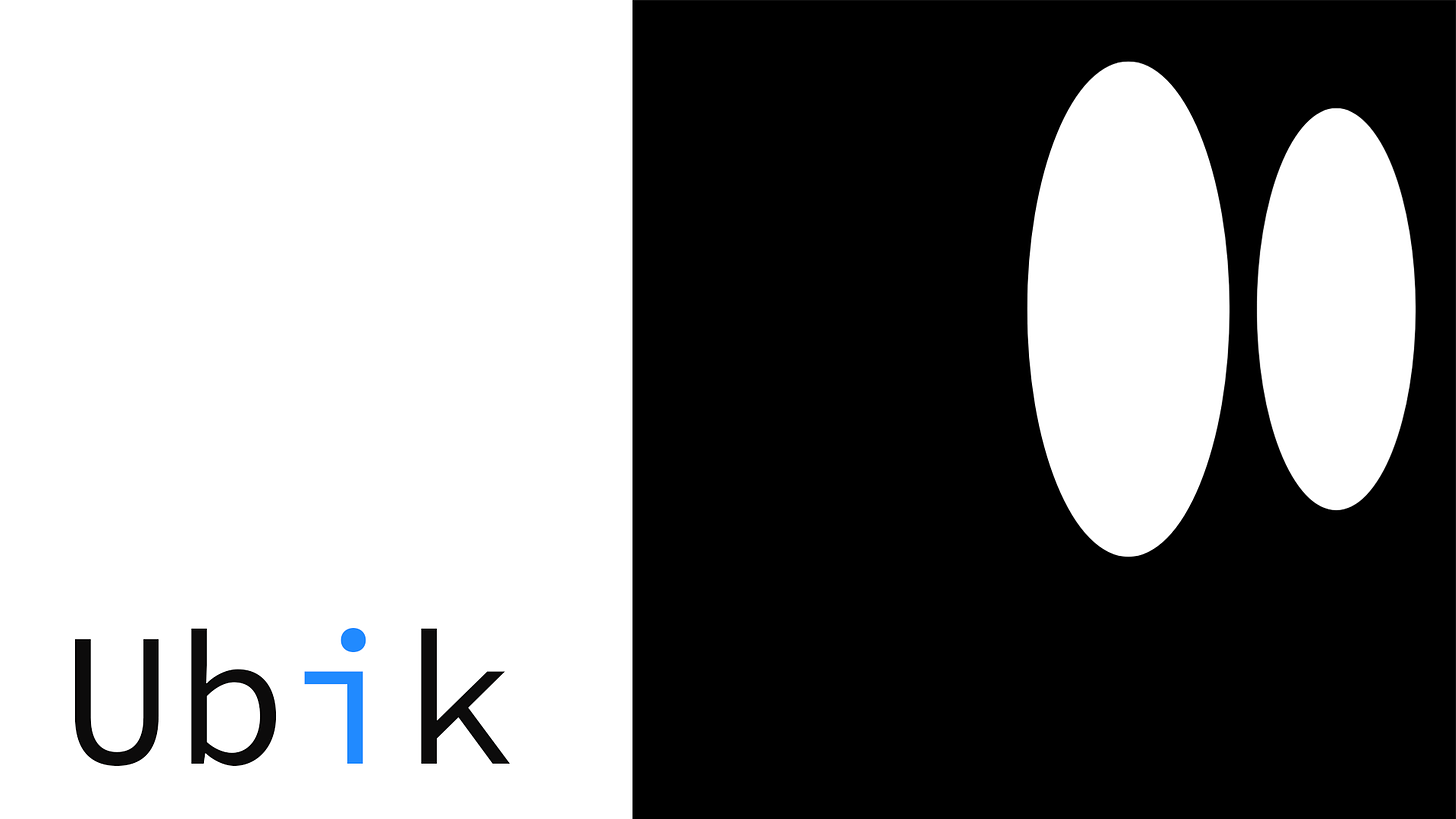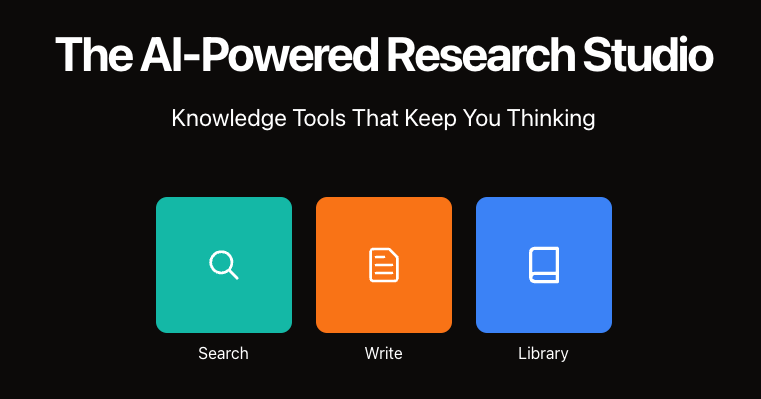- Published on
The Missteps of AI Hardware
Welcome to the Ubik Blog!
If you haven’t already subscribed, subscribe here!
Are AI Devices the New Smartphones?
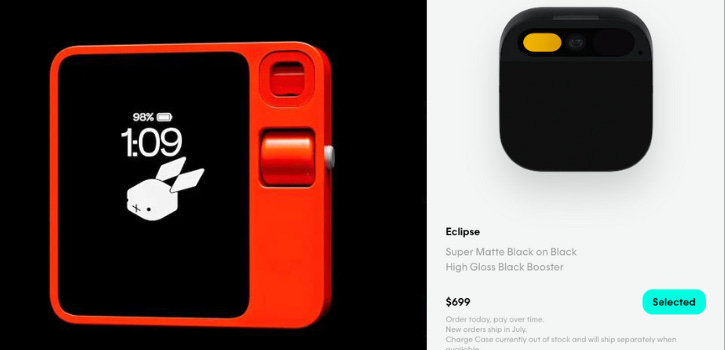 Screenshots from Rabbit R1 and Humane AI Pin homepages. (Rabbit R1 on the left and Humane AI Pin on the Right)
Screenshots from Rabbit R1 and Humane AI Pin homepages. (Rabbit R1 on the left and Humane AI Pin on the Right)
Are AI devices the next evolutionary step beyond smartphones or another tech gimmick? In 2023, a surge in AI hardware like the Rabbit R1 and Humane AI Pin has sparked debate among tech enthusiasts and critics. These voice-centric, wearable gadgets promise a new era of human-computer interaction, but do they deliver?
The product demos for the Rabbit R1 and the Humane AI pin included user stories like "Book me a flight to Berlin," which, in my opinion, is not just far from practical but fails to make a "revolutionary" product like this shine.
Practicality and User Experience
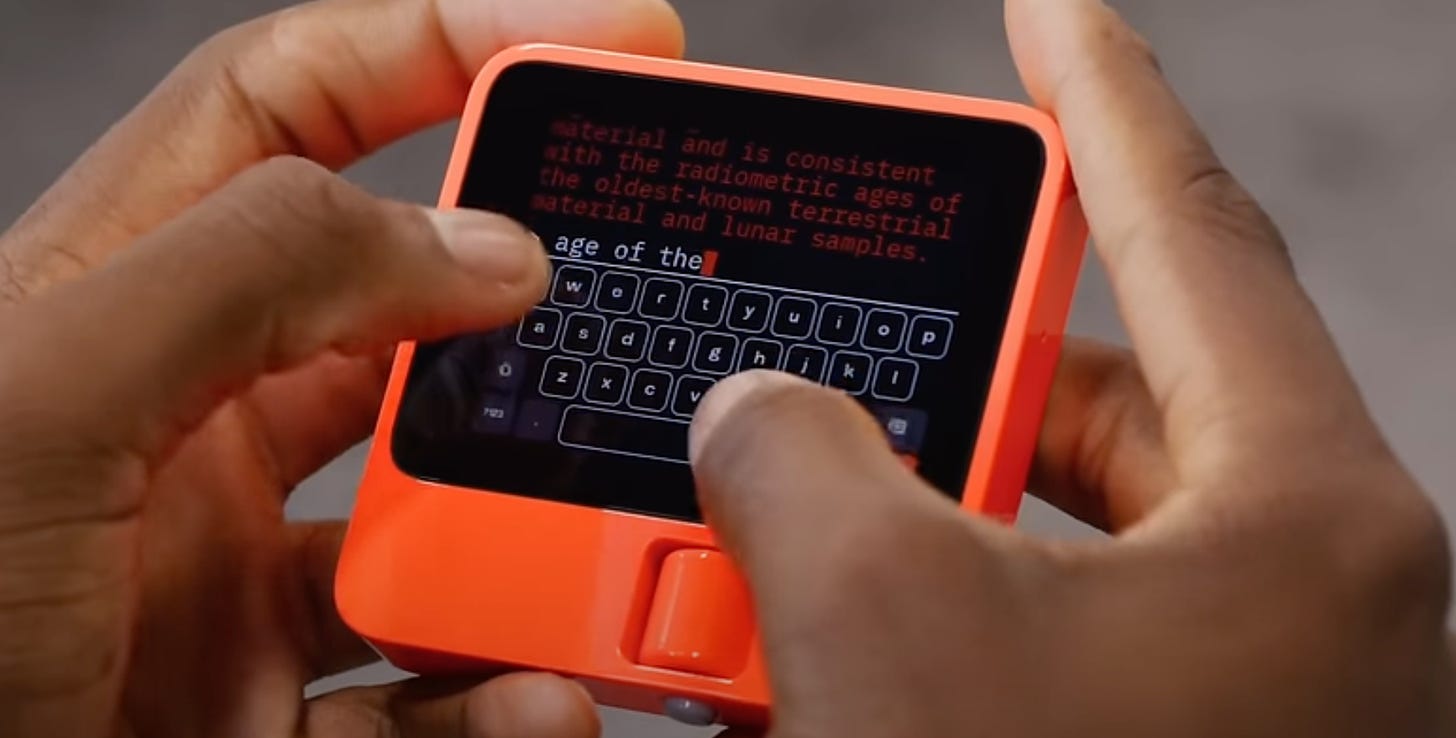 Screenshot from Marques Brownlee’s video “Rabbit R1: Barley Reviewable.”
Screenshot from Marques Brownlee’s video “Rabbit R1: Barley Reviewable.”
The smartphone was revolutionary due to its diverse and wide range of use cases. Everyone can pick up a smartphone and find a way to fit it into their daily workflow while still using it as entertainment during free time. Smartphones are simple and easy to use and are a direct evolution of the telephone.
New devices like the Rabbit R1 and the Humane AI Pin have no formal predecessor. This new form factor is rethinking human-computer interaction (but sometimes it goes wrong). Rethinking the interface is hard; screens have become an intrinsic aspect of technology and how humans interact with digital tools. We rely on haptic instances and manual moments that reward us for engagement.
**Case Studies:
Rabbit R1 and Humane AI Pin**
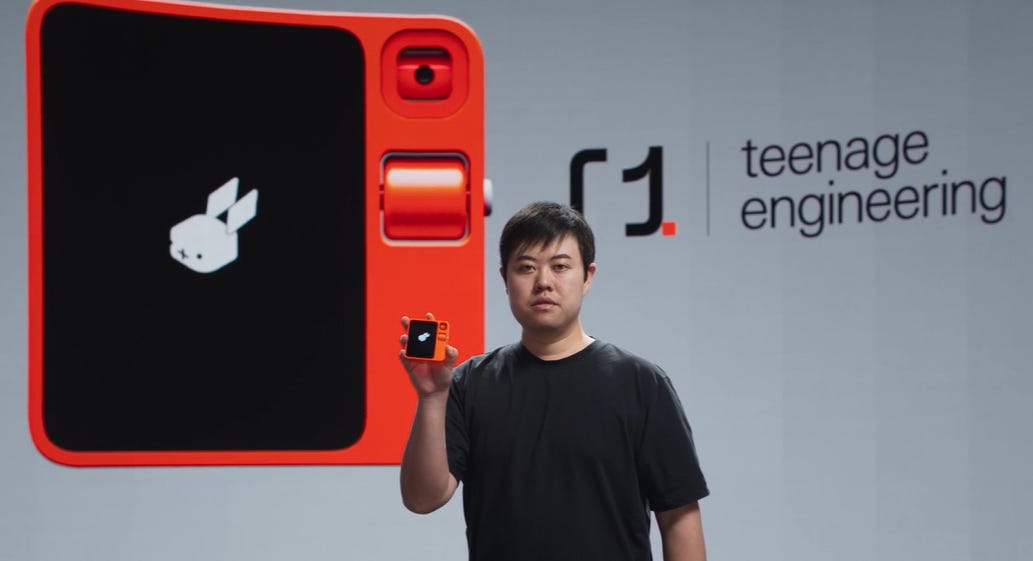 Jesse Lyu speaking at the Rabbit R1 keynote. (Source - Rabbit).
Jesse Lyu speaking at the Rabbit R1 keynote. (Source - Rabbit).
Rabbit R1
The Rabbit R1 has gained tons of hype over the last 5-6 months, selling $20 million in products. However, tech critics quickly saw the need for more functionality and the inconvenience of these new forms of AI devices. Grabbing tech magazine headlines like The Verge, "Rabbit R1 review: nothing to see here." Alternatively, Wired, "Review: Rabbit R1, You probably should not follow this rabbit down the rabbit hole." Popular tech review YouTubers like Marques Brownlee and Coffeezilla tore the Rabbit R1 apart for the inconsistency and, in some cases, complete lies about the device's capabilities.
In The Verge's review of The Rabbit R1 by David Pierce, David starts the piece talking about the Rabbit's immediate failure to differentiate between a taco and a Dorito. When asked to identify the food in his hand, the device failed to identify a tortilla chip. (Pierce, 2024). R1 users widely agree that their experience is not better than the smartphone in their pocket, and they find it hard to have another phone number and lack access to files and apps already integrated into habitual workflows, especially when the "AI Assistant" can barely understand what is happening in their environment.
The Wired described the Rabbit R1 as "Hare-Brained," a nice pun that made me realize why the tortoise always beats the hare. The Rabbit R1 overpromised and underdelivered (Chokkattu, 2024). Jesse Lyu, the founder and creator of the Rabbit R1, promised the device would be compatible with many apps like Spotify and Uber, but both had many user problems. He promised that the Rabbit R1 would change how we interact with technology; it made us question our technological future. Jesse even claimed that the Rabbit R1 and in-house Lamb technology were faster than ChatGPT; Coffeezilla (a tech review YouTuber) found that the Rabbit R1 was using "ChatGPT with some hardcoded scripts."
Humane Ai Pin
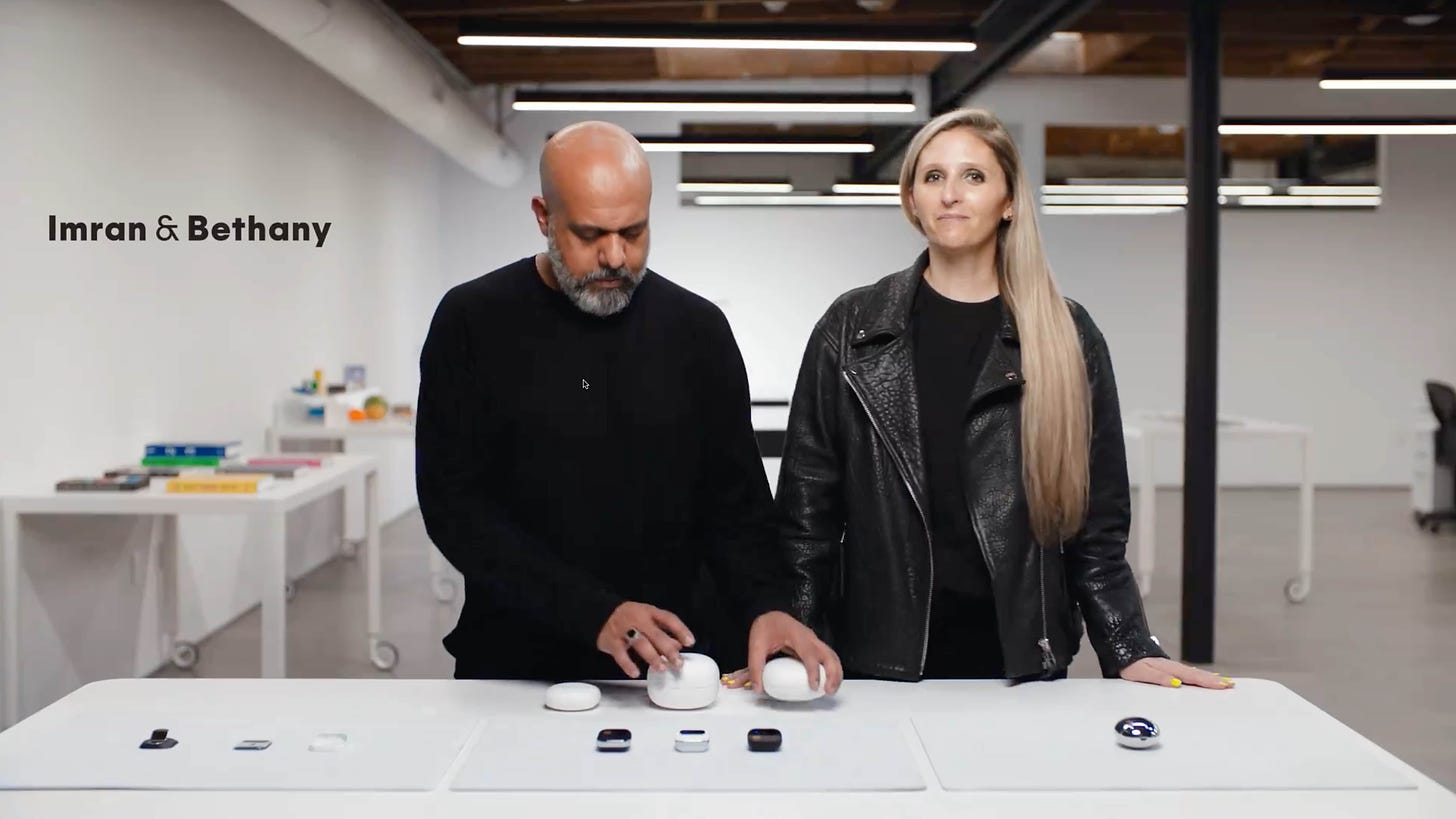 Humane AI Pin demo where the device was caught stating false information multiple times. (Source - Humane).
Humane AI Pin demo where the device was caught stating false information multiple times. (Source - Humane).
The Humane AI Pin was founded by former Apple executives Imran Chaudhri and Bethany Bongiorno, who are known for their work on the original iPhone and iPad. Despite their impressive credentials, the Humane AI Pin overpromised and underdelivered.
Unneeded features, like a laser screen projected onto your hand, epically missed the mark on functionality but beautifully epitomized where we are in tech today. Wearability and voice control are uncomfortable and limited in public spaces; the Humane AI Pin comes packed with useless features and gimmicks made for demos and investors—not consumers and power users.
The two former Apple Executives sold the vision well, using high-end materials and an "Apple-esque" look and feel. The device felt new and familiar. However, during Humane's Humane AI Pin demo video release, the device got basic facts wrong, leading to widespread distrust by possible users. Then we learned the device's price - 24 monthly subscription. Because of its lack of valuable features, the AI Pin is not worth the hefty price tag (Pierce, 2024).
What Makes AI Devices Practical?
Oddly, smartphones will see what we envision as the first efficient and functional AI assistants, whether new AI apps or OS overhauls like Apple, iOS 18, or the addition of Apple Intelligence. Smartphones are examples of peak hardware/form factor waiting for software that can change how we interact with and use these impressive devices in our pockets.
Despite the hype, these AI devices fail to deliver experiences that compete with smartphones. Users find it hard to have another phone number and need access to files and apps already integrated into their workflows. The Rabbit R1 and Humane AI Pin exemplify the difficulty of creating a new form of human-computer interaction without established norms and expectations.
Apple Intelligence may be the first application of AI to answer many of these questions. With full capabilities over iOS, Apple's demo showed us how capable AI can be when integrated with iPhones. It is an example of how other leaders like Google and Samsung should incorporate AI into their products that users are already familiar with worldwide.
The Future of AI Devices and the
Ubik Vision
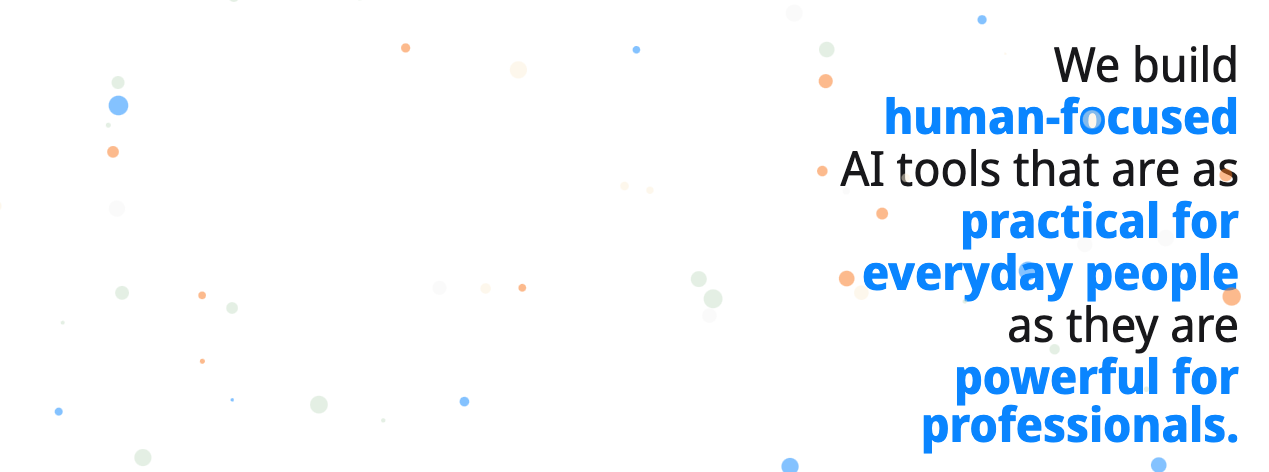 Ubik.Studio homepage & Mission.
Ubik.Studio homepage & Mission.
The next ten years will be full of gimmick-ridden devices, such as the Rabbit R1 and the Human AI Pin. Diamonds will be in the ruff like in the early 2000s and 2010s.
Smartphones will likely see the first efficient and functional AI assistants, whether through new AI apps or OS overhauls like Apple's iOS 18. The Rabbit R1 and Humane AI Pin will never beat the user experience of an iPhone 15, Samsung S24, or Pixel 8. These smartphones have thoughtfully tested and trialed the baseline of expectations and general needs of the average user.
Ubik Vision
We believe that digital tools should work for us. Our vision is a future where human-computer interaction is natural, productive, and practical.
Natural human-computer interaction means seamlessly integrating complex technologies into mundane tasks to get the most out of AI.
Productive human-computer interaction focuses on creating positive educational outcomes instead of quickly generated responses.
Practical human-computer interactions revolve around helping people with everyday problems and never feeling lost when an issue arises.
How is Ubik making steps toward this vision?
Fiig AI
We created Fiig AI, an AI research companion for students and academics.
Fiig helps users search academic databases more efficiently with features like AI summarization, bibliography creation, and advanced searching. Users appreciate these features when searching for niche topics, where advanced searching becomes vital for source discovery. Fiig proved that assistance is more productive for learning than generation.
Ubik Drive
We are building Ubik Drive, a secure, model-agnostic cloud drive with a built-in private AI assistant. Through user interviews, we found a common complaint: platforms like ChatGPT cannot help users manage files, extract key insights from their unique knowledge base, or keep their files confidential.
With Ubik Drive, users can privately and securely upload their files, create unique tags, and have the AI Assistant automatically sort and organize files for easy recall and insight extraction. Once files are uploaded, users can interact with their entire knowledge base through simple queries.
Ubik Hardware
Ubik Drive is our first step, and baseline framework and OS for uBot. An AI-centric hardware device that enables individuals, institutions, and enterprises to facilitate unique AI experiences. We are excited to share our plans for uBot and show you how we envision a productive, natural, and practical AI future.
A New Era[i]
The journey of AI devices is just beginning. While the Rabbit R1 and Humane AI Pin may seem far-fetched today, they pave the way for innovations that could one day redefine our interaction with technology. As companies like Ubik push the boundaries, the dream of practical, intelligent AI assistants inches closer to reality.
Work Cited
Chokkattu, Julian. "Rabbit's R1 Is Just Another AI-Powered Gimmick." Wired, Conde Nast, www.wired.com/review/rabbit-r1/. Accessed 8 July 2024.
Pierce, David. "Humane AI Pin Review: Not Even Close." The Verge, 11 Apr. 2024, www.theverge.com/24126502/humane-ai-pin-review.
Pierce, David. "Rabbit R1 Review: Nothing to See Here." The Verge, 2 May 2024, www.theverge.com/2024/5/2/24147159/rabbit-r1-review-ai-gadget.
Some cool stuff you should check out!
Was the new Rabbit R1 AI device a scam?
Marques Brownlee’s review of the Humane AI Pin.
Explore our tools and learn more about Ubik here:
Subscribe
